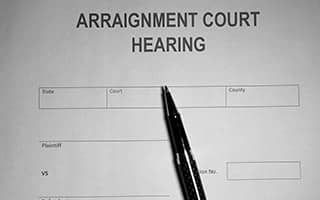Instant Court Case Lookup
The following is for information purposes only
Table of Contents
Indictments

An indictment is a formal written accusation issued by a grand jury stating that there is probable cause to believe an individual committed a specific criminal offense. It does not determine guilt but rather authorizes prosecution to proceed to arraignment and trial.
An indictment differs from a charge or complaint. A charge is a general term for any allegation of criminal conduct by the government. A complaint is a sworn statement, usually made by a prosecutor or law enforcement officer, filed before a magistrate to initiate proceedings or obtain an arrest warrant. An indictment, in contrast, is returned by a grand jury after all evidence has been reviewed.
The constitutional foundation for indictments lies in the Fifth Amendment, which mandates that no person shall be held to answer for a capital or otherwise infamous crime without a grand jury's determination. However, many states use alternative charging procedures.
How the Indictment Process Works
The indictment process serves as a crucial procedural safeguard in the criminal justice system, ensuring that no individual is brought to trial for a serious offense without sufficient evidence.
The Role of the Grand Jury
A grand jury is a panel of citizens, typically between 16 and 23 members in federal courts, empaneled to determine whether sufficient evidence exists to charge a person with a crime. Its purpose is accusatory, not adjudicatory; it screens potential cases to prevent unwarranted prosecutions. Proceedings are confidential, and only the prosecutor presents evidence, which may include documents, testimony, and hearsay.
Defense counsel does not participate. The grand jury uses the probable cause standard, determining whether a reasonable person would believe that a crime was committed and that the accused likely committed it. If satisfied, it returns a "true bill" (indictment); if not, a "no bill".
Indictment vs. Information
An information is a formal charging document prepared and signed by the prosecutor, subject to judicial review rather than grand jury approval. In federal cases, this procedure applies to misdemeanors or felonies when the defendant waives the right to a grand jury indictment.
Many states prosecute felonies through informations following a judicial probable-cause hearing, while others reserve indictments for the most serious crimes. Misdemeanors generally proceed by complaint or citation, bypassing the grand jury.
Federal vs. State Indictment Procedures
Under Federal Rules of Criminal Procedures 6 and 7, the U.S. Attorney presents evidence to a grand jury, and at least 12 jurors must concur to indict. The indictment must be clear, concise, and list essential elements.
States vary; some require grand juries for capital or serious felonies, while others rely on prosecutor-filed informations or judicial hearings. Regardless of jurisdiction, all systems require a neutral finding or probable cause before a felony case moves forward.
Types of Indictments
Indictments can take several forms, reflecting different procedural stages and confidentiality requirements.
A sealed indictment remains confidential until the defendant is arrested or formally notified, preventing flight or interference with ongoing investigations. While sealed, it is not accessible to the public or the defendant, and docket entries are often restricted. Once unsealed, typically after an arrest or when risks subside, the case proceeds normally to arraignment and discovery.
In contrast, an unsealed indictment is filed openly on the court's public docket, listing the charges, statutes, and material facts, subject to necessary redactions for privacy and safety.
A superseding indictment replaces an earlier one when the prosecution adds or removes defendants, introduces new counts, or corrects factual or procedural defects. It does not restart the case but updates the existing one. Time limitations still apply. Amended charges, often filed through an information, allow minor corrections without convening a new grand jury.
When a grand jury votes, a "true bill" indicates probable cause and authorizes prosecution. A "no bill" means insufficient evidence to indict. Although grand jury deliberations are kept confidential, prosecutors may re-present the case again if new evidence becomes available.
What Happens After an Indictment Is Issued
Once an indictment is returned, the court issues an arrest warrant or summons. If taken into custody, the defendant must appear promptly before a magistrate for arraignment, where the charges and potential penalties are explained. Counsel is appointed if the defendant is indigent and a plea is entered, typically guilty, not guilty, or no contest. The indictment replaces any prior complaint, and the court sets deadlines for discovery, motions, and hearings.
Following the arraignment, the court determines pretrial release by assessing flight risk and public safety. The options typically include release on recognizance, conditional release, secured bonds, or detention. Defense counsel may file pretrial motions, such as motions to suppress evidence, dismiss charges, or compel discovery.
After indictment, the accused retains fundamental constitutional rights, including the right to counsel, access to discovery materials, and a speedy and public trial under the Sixth Amendment. These protections ensure that the defendant can prepare an adequate defense while maintaining procedural fairness throughout the criminal process.
Accessing Indictment Records

Indictments typically become public once filed and the defendant is arrested or formally appears in court. The charging document and docket entries are then accessible through the court's public record system, often with redactions to protect sensitive information.
However, indictments may be kept sealed to preserve the integrity of ongoing investigations, safeguard witnesses, or prevent the accused from evading arrest. Juvenile cases, matters involving statutory confidentiality, such as sexual offenses, and sealed or expunged records remain permanently restricted.
How to Search for Indictment Records Online
Federal indictment records can be accessed through the Public Access to Court Electronic Records (PACER) system. State and local court portals vary by jurisdiction; some provide full-text indictments, while others list only docket summaries. Always verify the record's authenticity through the official court portal, as third-party databases may contain outdated or incomplete information.
How to Retrieve Indictment Records Offline
In-person requests can be made at the Clerk of Court's office in the relevant county or district. Provide identifying details, such as name, date of birth, or case number. Copy and certification fees generally apply. Accessing a sealed or restricted indictment record requires obtaining a court order to view or unseal the documents.
Sealed and Expunged Indictments
Courts may seal an indictment to prevent a defendant's flight, protect witnesses, or preserve the integrity of an active investigation. Sealing is temporary and typically lifted once the defendant is arrested or formally appears before the court, at which point the indictment or a redaction becomes public. Even after unsealing, grand-jury materials remain confidential by law.
Expungement or post-case sealing of indictment records depends on state statutes. Eligibility commonly follows dismissal, acquittal, or successful completion of diversion programs. Expungement generally removes the record entirely, while sealing restricts public access but preserves official visibility. Federal expungement is rare and requires statutory or equitable justification.
Frequently Asked Questions
The following questions and answers address common issues regarding indictments.
Can a defendant testify before the grand jury, and under what conditions?
Yes. A defendant may request to testify, but this occurs only if the prosecutor agrees. If permitted, the defendant may appear without defense counsel inside the grand jury room.
Is defense counsel allowed in the grand jury room?
No. Defense attorneys cannot be present during grand jury questioning. However, a witness may step outside the room at any time to speak with their lawyer.
What is a "target letter", and does receiving one mean indictment is imminent?
A target letter informs an individual that they are the primary focus of a grand jury investigation. While it does not guarantee indictment, it signals that prosecutors believe there is substantial evidence linking the person to the crime.
What is a "speaking indictment", and why do some indictments include detailed narratives?
A speaking indictment presents factual background and narrative detail beyond the essential charge. Prosecutors may use it to provide context or shape public understanding of the alleged conduct.
Can prosecutors rely on hearsay evidence before the grand jury?
Yes. Grand juries may rely on hearsay and evidence not admissible at trial because the evidentiary rules are more flexible during this stage.
How soon must the government indict after an arrest or complaint (federal and state timelines)?
In federal cases, prosecutors generally must secure an indictment within 30 days of an arrest based on a criminal complaint. States have varying time limits.
Can an indictment be amended, or must the prosecutor seek a new (superseding) indictment?
Material or substantive changes require a new or superseding indictment to be returned by the grand jury. On the other hand, minor clerical errors may be corrected by the court.
Are grand jury transcripts ever available to the defense or public, and how can they be obtained?
Grand jury transcripts remain sealed and unavailable to the defense or the public. They may only be released by court order when the defense shows a particularised need, such as for trial preparation or witness impeachment.
Does an indictment toll (pause) the statute of limitations for added or new charges?
The indictment tolls the statute of limitations period only for the specific charges contained in it. New or significantly different charges typically require a timely superseding indictment.
How does an indictment affect immigration status, professional licensing, and employment checks?
Although an indictment is not a conviction, it may trigger immigration review, licensing board inquiries, or appear in criminal history searches as a pending criminal matter, potentially affecting professional or employment outcomes.